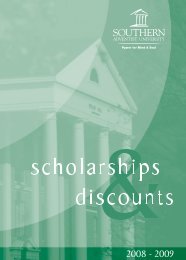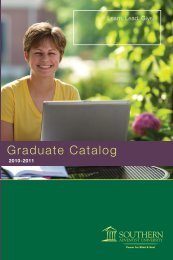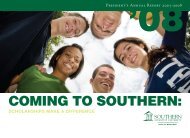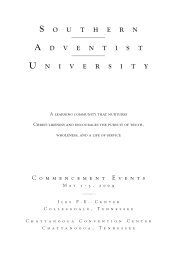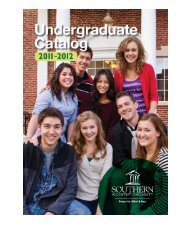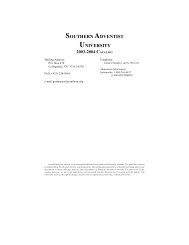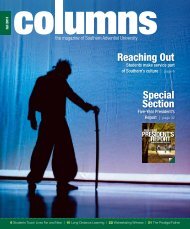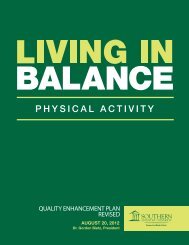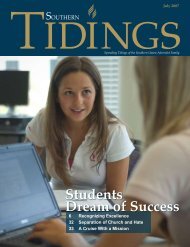COUN 582-A - Southern Adventist University
COUN 582-A - Southern Adventist University
COUN 582-A - Southern Adventist University
- No tags were found...
Create successful ePaper yourself
Turn your PDF publications into a flip-book with our unique Google optimized e-Paper software.
COURSE OUTLINE<strong>COUN</strong> <strong>582</strong>-AClinical Practicum I: Clinical Mental Health Counseling1 Semester CreditMondays, 4:00-5:20 p.m.[Meeting Room]Fall [Year]PROFESSOR:[Name & Title][Office location][Phone number][E-mail address]Office Hours:I. COURSE DESCRIPTION:Orientation to the field experience. The student will be oriented through the use of books, videos,presentations, discussions, observation, and practice sessions.II.REQUIRED READING:Haney, J. H. & Leibsohn, J. (1999). Basic Counseling Responses: A multimedia Learning System forthe Helping Professions. Belmont, CA: Cengage Learning.Boylan, J. C. (2009). Practicum and internship: Textbook and resource guide for counseling andpsychotherapy (4 th ed.). New York: Routledge.School of Education and Psychology, <strong>Southern</strong> <strong>Adventist</strong> <strong>University</strong>. (2011). Clinical Mental HealthCounseling Practicum Manual. Collegedale, TN: Author.III.SUPPLEMENTAL READING:1. Selected books and articles:American Psychiatric Association. (2013). Diagnostic and statistical manual ofmental disorders (5 th ed.). Washington DC: Author. (Strongly suggested)Baird, B. (2007). The internship, practicum, and field placement handbook: A guide for thehelping professions (5 th ed.). Upper Saddle River, NJ: Pearson.
<strong>COUN</strong> <strong>582</strong>-A – Clinical Practicum I: CMHCFall 2013 – Page 2Clinton, T., & Ohlschlager, G. (2002). Competent Christian counseling. Colorado Springs,CO: Waterbrook Press.Dillon, C. (2003). Learning from mistakes in clinical practice. Belmont, CA: Brooks/ColeThomson Learning.Jongsma, A.E., & Peterson, L.M. (2001). The complete psychotherapy treatment planner.New York: John Wiley. (There is a whole series of these books, with Jongsma as seniorauthor that are very practical, useful guides to diagnosis and treatment planning.Jongsma, A. E., Peterson, L. M. and McInnis, W. P. TheraScribe v3.0: The ComputerizedAssistant to Psychotherapy Treatment Planning, John Wiley & Sons, New York,1997. (Software Program).Morrison, J., & Anders, T. F. (2001). Interviewing children and adolescents: Skills andstrategies for effective DSM-IV Diagnosis. New York: Guilford.Myers Kiser, P. (2008). The human services internship (2 nd ed.). Belmont, CA: Thomson &Brooks/Cole.Zuckerman, E. L. (2005). Clinician’s thesaurus: The guide to conducting interviews andwriting psychological reports (6 th ed.). New York: Guilford.2. Selected Relevant Websites:American Academy of Child and Adolescent Psychiatry: http://www.aacap.org/American Association of Christian Counselors: http://www.aacc.net/American Counseling Association: http://www.counseling.org/American Psychiatric Association: http://www.psych.org/American School Counselor Association: http://www.schoolcounselor.org/National Board for Certified Counselors: http://www.nbcc.org/IV.PERSPECTIVE AND FOCUS OF THE COURSE:Counseling students consider their field placements among the most influential experiences oftheir careers. At the same time, there is a risk for their academic coursework to provide onlyindirect preparation for their field placements which is oftentimes their first “real world”exposure. This course is designed to bridge the gap between academic coursework and theknowledge, skills, and dispositions that are found beyond the classroom. Therefore, much of the
<strong>COUN</strong> <strong>582</strong>-A – Clinical Practicum I: CMHCFall 2013 – Page 3first sessions deal with practical questions students will be asking in the beginning of their firstfield experience. Next, they will be guided through the process of careful thought, analysis andreflection as you practice specific skills that are crucial for counseling professionals. Finally, thecourse will move toward the issues involved as students end the field experience, and the stepsthey will need to take to apply for a job and obtain license or certification in your field.V. COURSE ALIGNMENT WITH CONCEPTUAL FRAMEWORK:This course is congruent with the Conceptual Framework of the Counseling Programs at the Schoolof Education and Psychology. This Conceptual Framework is aligned, in turn, with the Council forAccreditation of Counseling and Related Educational Programs (CACREP) found in the SEP StudentHandbook.To Serve, To Lead, To TransformA. Mission of the School of Education and Psychology: Our mission is to prepare all studentsto be effective professionals who demonstrate a commitment to the pursuit of truth, wholeness,and a life of service in a pluralistic society.B. Goal of the School of Education and Psychology: The goal of the professional education unit is tofacilitate the comprehensive development of professionals as servant leaders in theircommunities. This goal is realized by providing opportunities for the candidate to becomeeffective in the following roles: (a) a caring person, (b) an informed facilitator, (c) a reflectivedecision-maker, and (d) a committed professional. These then lay the foundation for professionalexcellence and constitute the core objectives of the professional education unit.C. Core Objectives and Expected Proficiencies:1. As a caring person, the candidate/professional will demonstrate knowledge, skills, anddispositions by(a) designing experiences that honor best practices related to multicultural clientpopulations(b) nurturing relationships by showing warmth, care, respect, and fairness to allindividuals.(c) considering the influence of community, school, and family context.(d) emulating the example of Christ-like service2. As an informed facilitator, the candidate/professional will demonstrate knowledge, skills,and dispositions by(a) providing nurturing environments and services, based on developmentally andculturally appropriate practices(b) demonstrating understanding of central concepts.(c) demonstrating understanding of how individuals develop.(d) working effectively with a diverse client population.
<strong>COUN</strong> <strong>582</strong>-A – Clinical Practicum I: CMHCFall 2013 – Page 5VII.METHODS OF INSTRUCTION:The instructor will use a variety of methods of instruction, including class discussions, audiovisualmedia, analysis of personal experience, in-class and field activities, readings, simulated counselingexperiences, and reports.VIII. DIVERSITY CONSIDERATIONS:During this course, students will consider how diversity issues are likely to become pronouncedduring their field experience, and how these issues may impact the counseling process. Studentswill participate in class activities and exercises to develop cultural self-awareness and skills inworking with people who are culturally different.IX.TECHNOLOGY REQUIREMENTS:During this semester, students will be presented with opportunities to view and analyze videocases focusing on topics relevant to the content of this course. Students will also be able to recordthemselves as they role-play counseling sessions with their classmates.X. COURSE CONTRIBUTION TO THE SEP GOAL OF SERVANT LEADERSHIP AND INTEGRATION OFFAITH:As stated above, the goal of the SEP professional education unit is to facilitate the comprehensivedevelopment of professionals as servant leaders in their communities. Toward that goal, studentswill be expected to take turns role-playing the role of a client and a counselor with their classmates,as they conduct simulated counseling sessions. In addition, they will be asked to assist each other inevaluating their role-play sessions by reviewing the interventions used. Numerous experientialopportunities will be available to demonstrate warmth, care, respect, and fairness to all individualsin the counseling session, as it is supported by the Christian Seventh-day <strong>Adventist</strong> faith andproficiency 1d of the SEP Conceptual Framework.XI.CLASS POLICIES:1. Special Needs Accommodations:In keeping with <strong>University</strong> policy, any student with a disability who needs academicaccommodations should contact Disability Support Services at 236-2574 or stop by Lynn WoodHall, room 137 to arrange a confidential appointment with the Disability Services Coordinator(DSC) before or during the first week of classes. (Students who request accommodations afterthe third week of the semester might not complete the process in time to receiveaccommodations for that semester.) Legally, no retroactive accommodations can be provided.For more details, visit the Disability Support Services website atwww.southern.edu/disabilitysupport.
<strong>COUN</strong> <strong>582</strong>-A – Clinical Practicum I: CMHCFall 2013 – Page 6Accommodations for disabilities are available only as recommended by Disability SupportServices. Students whose accommodations are approved will be provided confidential letterswhich students should review and discuss with their professors in relation to particular courserequirements.2. Academic Integrity:Academic integrity is an essential part of the educational process. In this university setting, weseek to nurture independent thought and to maintain a professional and Christian code ofethics that upholds our own personal integrity and that of the academic community.Consequently, dishonesty of any kind is unacceptable and will result in a failing final grade forthe course. If students are uncertain if a certain course of action is ethical, they may refer tothe Academic Honesty Policy listed in the current academic Catalog or consult the instructorfor specific guidelines.3. Attendance and Participation:Attendance in class is of vital importance. Students are expected to be present and punctualfor each class. Along with their presence in class, a measurable amount of enthusiasm isexpected as they actively participate in class discussions and activities.Given that one cannot participate effectively in class sessions without being present, eachabsence from class will diminish students’ participation points. Exceptions to this stipulationmay be provided by the instructor only in cases of extenuating circumstance (e.g., seriousillness, accident). If students should miss a class period for whatever reason, it will be theirresponsibility to find out from a classmate what happened in class, to master the conceptsand skills covered, and to obtain a copy of any material distributed.Students will also lose 10 points of their participation credit if they are observed:• Using laptop computers to complete requirements for other courses, to chat with friends,to answer e-mails, or to simply entertain themselves on the internet while instructors orany of your classmates are speaking. Laptop computers will only be allowed for classpresentations, to engage the rest of the class in a meaningful learning activity, or tocomplete in-class assignments directed by the instructor.• Sustaining private conversations, interrupting others, making negative comments aboutothers and/or displaying any type of behavior that is considered to be disruptive anddisrespectful in a class setting. Depending on the nature of the inappropriate behaviordisplayed, students may also be asked to leave the classroom for that particular classsession, for the entire semester, or will receive a final grade of F.
<strong>COUN</strong> <strong>582</strong>-A – Clinical Practicum I: CMHCFall 2013 – Page 74. Make-up or Late Work and Extra-credit:All assignments are due on the dates specified in the course outline and must be submitted bythe beginning of the class period. Late work does not generate credit. It is students’responsibility to plan ahead and deliver a product in a professional manner. If, however,students are experiencing an unusual circumstance, they should contact the instructor as soonas possible regarding the situation. If there is not an extenuating circumstance and studentshave only a partially complete the project when it is due, they should go ahead and submit theproject as it is for partial credit. Note that there are no extra-credit assignments in this course.5. Course Evaluation:Near the end of the semester, students will need to evaluate this course. <strong>Southern</strong> <strong>Adventist</strong><strong>University</strong> encourages all students enrolled in courses to complete course evaluations as partof the ongoing process of improving course delivery and academic standards. Students mayaccess the online evaluation at access.southern.edu by logging in using their SAU e-mail andpassword. Then select Course Evaluation from Course Tools. All comments and evaluationsare completely anonymous and the results are made available to professors only after gradesare submitted to the Records Office.XII.COURSE REQUIREMENTS AND ASSESSMENT:The following requirements will be used to evaluate students’ ability to learn the specificobjectives that have been established for this particular course. The identifiers between bracketsrefer to the course objective or objectives which are being assessed by the given requirement.These objectives can be found under Section VI-Course Objectives of this syllabus.Results from all requirements listed below will contribute to students’ final grade in this course.Results from requirements specifically noted with the letters (AP) will be entered into the SAUCounseling Programs Assessment Plan for program quality assurance purpose.1. Class Participation (80 points) [Objectives 1-7]:Desirable class participation is described as:a. contributing to the discussion in nearly every class, either as an individual or as a memberof a group,b. volunteering to answer questions and seeking to make substantive contributions. In someinstances, contributions will add a unique insight to the discussion,c. asking questions when not understanding,d. Having a positive attitude, engaging enthusiastically in class activities, respecting others’opinions, and evidencing an open mind to their ideas.e. Given the seminar and participative nature of this course, students will be expected to beprepared for class by reading the text chapter listed on the course schedule for that date,
<strong>COUN</strong> <strong>582</strong>-A – Clinical Practicum I: CMHCFall 2013 – Page 8as this material will form the basis for class discussions and interaction. If students do not readtheir chapter ahead of time, they will feel very lost because they will be asked to engage inexperiential activities that will be familiar only if they have read the assigned chapter inadvance.2. Interview with faculty member (20 points) [Objectives 1, 2]:During the first part of the semester, students will be expected to make an appointment witheither the SAU Counseling Clinic Coordinator or the Director of the Counseling Programs anddiscuss with them any questions they may have related to the Practicum II and Internshipexperiences. A form indicating completion of this assignment is provided at the end of thissyllabus and should be submitted to the instructor on the date specified on this coursecalendar.2. Basic Counseling Responses Exercises (40 points) [Objective 4]:Students will be expected to complete and turn in written exercises as assigned from theirtextbook Basic Counseling Responses (BCR), and specified on the course calendar. Theircompletion of these exercises before class will be very important because they will then bepaired with one of their classmates to role-play in class the counseling microskills covered onthese exercises.3. Supervision Reflection Paper (60 points) [Objective 7] (AP):After studying Chapter 5 of the textbook, students will be required to write a three, doublespacedpage reflection paper addressing the following questions:a. What particular challenges have they encountered in past supervisory experiences, andhow have they handled them?b. Considering their particular personality and past experiences, what do they think they willwant and need in their counseling supervisory relationship?c. What particular model or models of supervision will feel most comfortable for them?d. How would they like to grow in their skills to use supervision effectively?e. What do they feel they will need in a supervisor when they enter the Clinical Practicum IIand Internship experiences?5. Case Presentation (100 points) [Objectives 3, 4, 5 & 6] (AP):During the second part of the semester, students will be expected to conduct a formal threesessioncrisis counseling intervention with one of their classmates. Each pair will then beexpected to give a 30-40 minute presentation of their case to the class, including thefollowing:
M – 11/11 •Case Presentations •Case Presentation –Team 1M – 11/18 •Case Presentations •Case Presentation –Team 2M – 11/25 •Case Presentations •Case Presentation –Team 3THANKSGIVING BREAK – 11/27 to 12/1M – 12/2 •Case Presentations •Case Presentation –Team 4M – 12/9 •Boylan & Scott, Ch. 10 –Preparation forInternshipM – 12/16 •End of Course Issues •SupervisionReflection PaperFINAL EXAMS WEEK – 12/15 to 12/18
MEETING WITH FACULTY<strong>COUN</strong> <strong>582</strong> – Clinical Practicum IProfessor’s Name:Student’s Name: Topics Discussed: How this was beneficial:Student’ signature: _Professor’s signature:Date:



